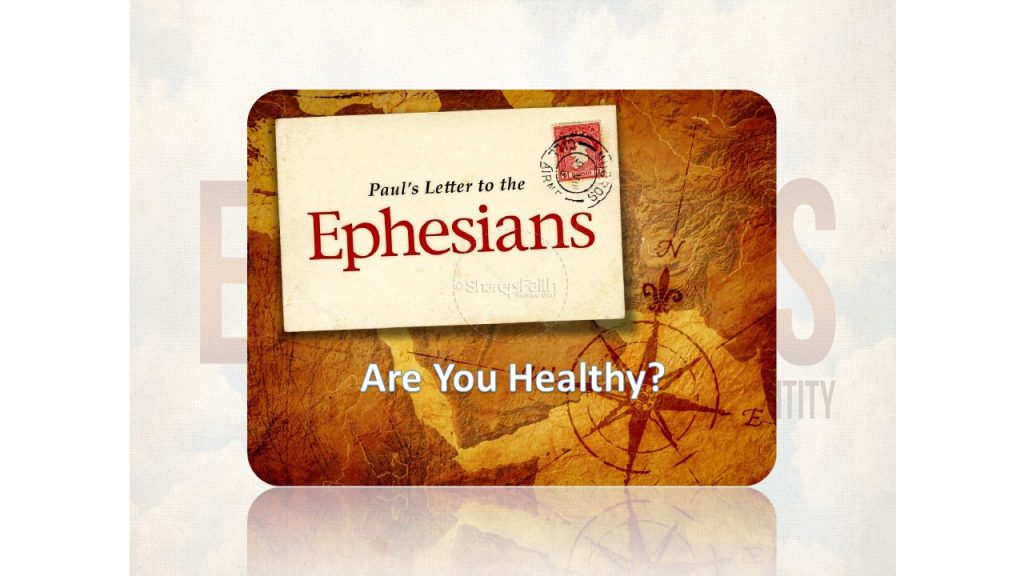
Ephesians 4:1-6
Is your church healthy?
The first three chapters of Paul’s letter to the Ephesians address our position as followers of Jesus. The next three chapters speak about the very practical aspects of our Christian walk. We need to know our position before we can look at our walk.
Paul urges the church in verse one to walk worthy of their calling. Being a follower of Jesus is not a religion or becoming a nice person who follows a set of rules, becoming a Christian is about becoming a new person. Walking a different walk.
The term Christian literally means, “little Christs”. The more we walk with him, the more we look like him, daily being changed into his image.
Paul knew who he was. In verse 1 of chapter 4 he begins, “I therefore, a prisoner for the Lord…”
Paul didn’t say, “I therefore a prisoner of Rome”. He didn’t let his temporary situation define his position. Paul was a prisoner for Jesus and he surrendered his life to the Lordship of Jesus Christ. His position with Christ had led him to be temporarily imprisoned in Rome.
Paul was not defined by His temporary situation. Are you defined by your current work situation, relationships, or financial status?
If you are defined by your temporary situation, you will never know what it means to walk in a manner worthy of the calling to which you have been called.
As followers of Jesus we have a common call, we are all saved by grace alone in Christ alone. We share a common experience of grace. And this is what unites us.
A healthy church is marked by unity.
When a church struggles with a lack of unity, it is often because they have taken their eyes off their common call and identity.
In verses 2 and 3, Paul explains how to practically walk worthy of the calling by listing five characteristics of the follower of Jesus: humility, gentleness, patience, love, and unity.
Jesus exemplified these 5 characteristics in his life on the earth:
Humility (Philippians 2:5-8); Gentleness (Matthew 11:28-29); Patience (1 Timothy 1:16); Love (Romans 5:8); and Unity (Ephesians 2:14).
Jesus is our example of how to walk as Christians. The more we look like Jesus individually, the more we live like Jesus relationally, and the more united the church will be.
Looking at each of these individually:
Humility
Paul constantly refers to humility as an essential characteristic of being a Christian in his letters. Humility was not common in the first century, Greek literature shows us that pride was highly valued and admired. We live in such a similar time. If people a thousand years from now look at our culture, they would see a culture obsessed with our own self-image.
Our culture screams, “exalt yourself, pamper yourself, think about yourself first”. But being a follower of Jesus calls us to walk in the opposite spirit (Philippians 2:3).
Tim Keller wrote, “the essence of gospel-humility is not thinking more of myself or thinking less of myself, it is thinking of myself less”.
Gentleness:
This does not mean weakness or timidity, rather it is self-control.
Moses, arguably the greatest leader in the whole Bible, was the role model of meekness and gentleness (Numbers 12:3).
Moses had a special relationship with the Lord. He knew that God would defend him, and God was the source of his strength.
Galatians 5 tells us that gentleness is a fruit of the spirit and it is the way we are to live as believers.
Patience:
For some of us, no matter how fast the microwave heats up the milk, it will never be fast enough. A lack of patience is a display of a lack of humility and a lack of love. In 1 Corinthians 13, the Bible says that love is patient.
So how do we cultivate patience? By relying on the Holy Spirit and meditating on the patience that Christ has shown us (2 Peter 3:9).
Accepting one another in love:
Out of relationship comes grace. Unity in the church is impossible without loving acceptance of our differences. The Bible says in 1 Peter 4:8, “Love covers a multitude of sins”
Diligently keeping unity.
Verse 3 says, “eager to maintain the unity of the Spirit in the bond of peace.
Notice Paul doesn’t write, “work towards unity”. This is an active maintaining, not a passive resting in unity.
We don’t create unity. We have unity because of the Holy Spirit. God unites us as the body of Christ, our role is to keep the unity.
How do we keep unity?
- By walking in humility and preferring others.
- By renouncing harshness and walking in gentleness towards others
- By setting aside our own agenda and walking in patience.
- By setting aside our own expectations and walking in love.
Anytime the church lacks unity, it is because we have stopped living in Christlike humility, patience, gentleness, and love.
Then in verses 4 to 6, we have what was possibly an early church creed, which includes seven “one” statements.
One body: the church is the body of Christ.
One Spirit: The Holy Spirit is the one who creates unity and then empowers us to maintain it.
One hope: We share a common hope in Jesus Christ. This hope is not wishful thinking, and the Greek word used here is one of trusting in a certain outcome. Jesus is coming again and those who put their trust in him will be saved.
One Lord: The early believers, by stating that Jesus is Lord, they were proclaiming that Caesar is not Lord. This could mean the death penalty. By declaring Jesus is Lord, we are giving him authority and lordship over every decision of our lives.
One faith: These are the essential truths of our faith.
One baptism: This may refer to the act of being baptized in water, but it probably means what John the Baptist was referring to in Luke 3:16.
One God and Father: We have been adopted into the family of God. Regardless of our ethnicity, we are all part of one body.
This creed includes the doctrine of the trinity. The three in one, Father son and Holy Spirit are in perfect unity. The trinity not only creates unity but serves as the ultimate picture of unity.
A healthy church maintains unity.


